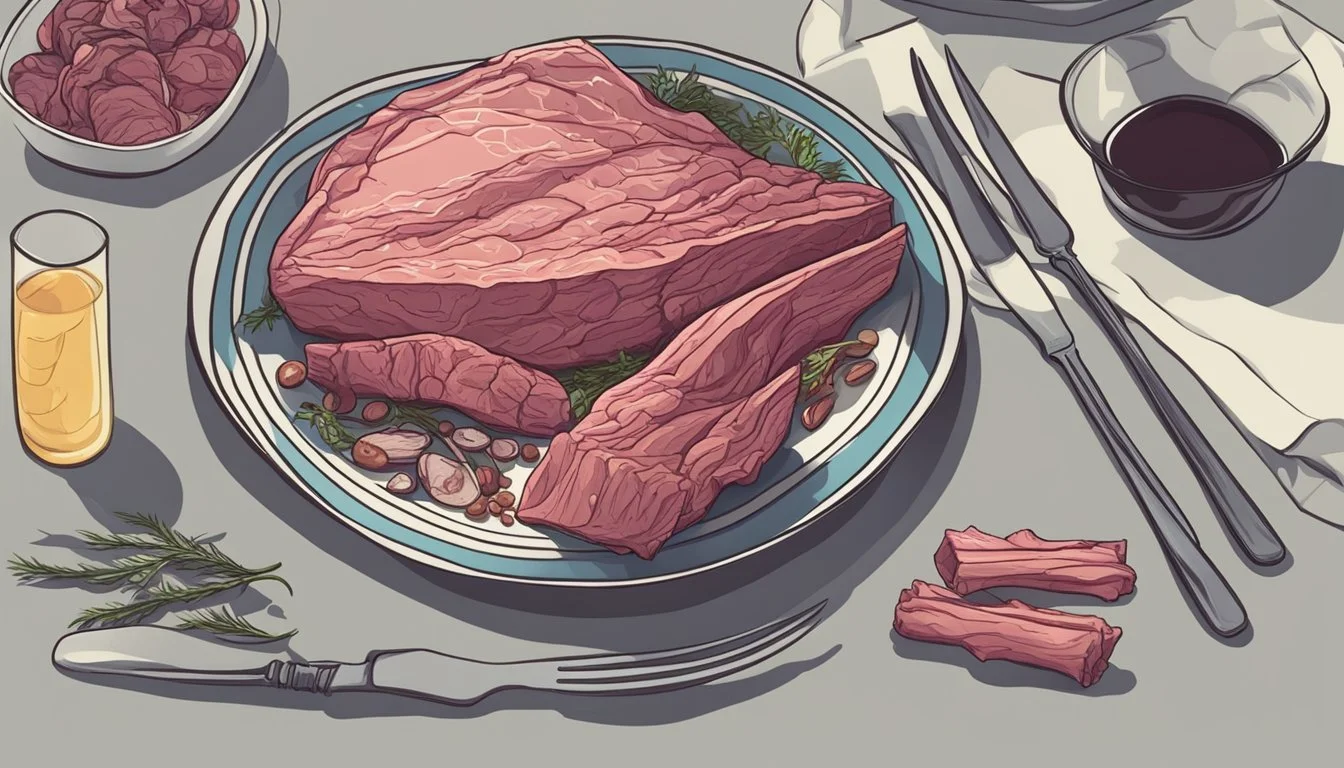Has Anyone Died from the Carnivore Diet
Analyzing Health Risks and Evidence
The carnivore diet, characterized by its exclusive consumption of animal products and elimination of plant-based foods, has been contentious in health circles. Proponents claim it can yield significant health benefits, including weight loss and improved metabolic markers, echoing the ancestral eating habits of humans. However, its safety and long-term health implications remain debated, with concerns about nutritional deficiencies and potential health risks due to the absence of plant-based nutrients.
Inquiries into whether the carnivore diet has been the direct cause of death are complex, as individual medical history, the presence of underlying health conditions, and diet duration contribute to health outcomes. To date, there is no clear evidence to conclude that the carnivore diet has directly caused fatalities. Nevertheless, medical professionals urge caution, advising those interested in the carnivore diet to approach it under supervision and make informed decisions based on individual health profiles.
Overview of the Carnivore Diet
The Carnivore Diet is an exclusive regimen advocating for the consumption of meat and other animal products while eliminating plant-based foods, provoking both interest and concern in nutrition circles.
Defining the Carnivore Diet
The Carnivore Diet strictly emphasizes the intake of animal products such as meats, dairy, and eggs, excluding all other food groups including fruits, vegetables, grains, and any plant-derived foods. Advocates of this diet often claim health benefits such as weight loss and improved mental clarity, although these claims are debated and not universally endorsed by the nutrition community.
Comparing Nutrient Intake with Other Diets
Nutritionally, the Carnivore Diet is distinctive because it supplies a high content of protein and animal fats, while lacking in dietary fibers and certain vitamins found predominantly in plant foods. Here is a comparison of nutrient intake:
Protein:
Carnivore Diet: High
Other Diets: Varied
Fat:
Carnivore Diet: High
Other Diets: Varied
Fiber:
Carnivore Diet: None
Other Diets: High
Vitamins:
Carnivore Diet: Varied (Low in some plant-derived vitamins)
Other Diets: Varied (Typically higher in plant-derived vitamins)
Unlike diets that include a variety of food groups, the singular focus on animal products in the Carnivore Diet may lead to deficiencies in certain nutrients primarily found in plant-based foods, hence the ongoing discussion about its long-term nutritional adequacy.
Potential Health Impacts
The carnivore diet, consisting exclusively of animal products, has been linked to both significant health benefits and potential risks.
Benefits of an All-Meat Diet
Proponents of the carnivore diet argue that it can lead to a range of health improvements. They claim weight loss is a common benefit since the diet can help address obesity by reducing calorie intake and stabilizing blood sugar levels, a factor related to diabetes management. Anecdotal evidence suggests that some individuals experience relief from inflammatory conditions and joint pain, while others report enhanced mental health.
Obesity: Reduced calorie intake can lead to significant weight loss.
Diabetes: Stabilization of blood sugar levels helps in managing diabetes.
Inflammation and Joint Pain: Anecdotal reports of reduced inflammation and alleviated joint pain.
Mental Health: Some individuals claim enhanced mental clarity and well-being.
Risks and Challenges
Conversely, the carnivore diet poses several health risks due to its restrictive nature. Nutrient deficiencies, such as the lack of fiber, can cause digestive issues and constipation. The diet's high content of red and processed meat has potential links to increased risks of cancer and heart disease. Limiting the diet to mostly or exclusively meat can lead to high blood pressure and may exacerbate pre-existing inflammatory conditions due to high levels of dietary saturated fat.
Nutrient Deficiencies: Potential for deficiency in fiber and certain vitamins and minerals.
Digestive Issues: Lack of fiber can result in constipation and other digestive problems.
Cancer and Heart Disease: Possible increased risk due to high consumption of red and processed meats.
High Blood Pressure and Inflammation: Meat-heavy diets can contribute to high blood pressure and inflammation.
Specific Nutritional Concerns
The carnivore diet raises various specific nutritional concerns due to the exclusion of plant-based foods. Attention to nutrient intake is vital to avoid deficiencies and negative health outcomes.
Vitamin and Mineral Adequacy
Individuals on a carnivore diet may not receive a full spectrum of vitamins and minerals that are typically found in plant foods. For example:
Vitamin C: Primarily found in fruits and vegetables, it is essential for the maintenance of skin, blood vessels, bones and cartilage.
Vitamin D: While it can be synthesized through sun exposure, dietary sources often come from fortified foods, which are excluded on this diet.
Minerals: A diversified intake of minerals like magnesium and calcium, commonly found in nuts, seeds, and leafy greens, might be limited.
I always prefer buying vitamin C, vitamin D, magnesium, and calcium online because of the added convenience!
Fiber and Digestive Health
Fiber is a crucial part of the diet for maintaining digestive health. It is exclusively found in plant foods, hence, its absence on a carnivore diet can lead to concerns over:
Gastrointestinal function: High-fiber foods help to maintain bowel regularity.
Long-term health risks: A lack of fiber may elevate the risk of developing certain gastrointestinal disorders.
Saturated Fat and Cholesterol
A diet high in ruminant meat can significantly increase the intake of saturated fat and cholesterol. These are points of consideration:
Heart health: Elevated saturated fat and cholesterol levels have been linked to increased risk of heart disease.
Balanced intake: It is important to monitor levels of fat consumption, aiming for a balance between saturated and unsaturated fats.
It’s important for those considering this diet to consult with a health care provider to ensure they are meeting their nutritional needs and not compromising their health.
Health Outcomes and Scientific Evidence
The carnivore diet, consisting solely of animal products, has been subject to scrutiny by healthcare professionals and scientific studies regarding its long-term health outcomes.
Studies on Long-Term Health Outcomes
Scientific evidence concerning the long-term health outcomes of a meat-only diet is limited. Most existing studies focus on short-term effects, which provide insights into potential benefits such as weight loss or improved symptoms in certain autoimmune conditions. However, longer-term studies are scarce, and the evidence available is not sufficient to conclusively determine the diet's safety or efficacy over extended periods. Healthcare providers generally reference Dietary Guidelines for Americans to advocate for a balanced diet that includes both plant and animal foods, suggesting that a diet forsaking such balance may pose health risks.
Expert Opinions and Recommendations
Healthcare providers, including doctors and registered dietitians, often express concern regarding the exclusion of plant-based foods, which offer essential nutrients. They stress the importance of a varied diet that aligns with science-backed dietary guidelines. Despite individual anecdotal evidence of health transformations, the medical community’s consensus advises caution, recommending that individuals consult with a healthcare provider before undertaking such a restrictive dietary regimen.
Personal Experiences and Anecdotes
Personal anecdotes from individuals on the carnivore diet vary, with some claiming significant health benefits and others voicing concerns. These stories provide an insight into the multifaceted nature of the diet's impact on health.
Testimonials from Carnivore Diet Followers
Brian Nowicki underscored the transformative impact of the diet, sharing that he lost 80 pounds and experienced notable health improvements.
Anthony Girouard highlighted the diet's effect on his diabetes and mental clarity, alongside a 30-pound weight loss.
These testimonials often surface on YouTube channels and other social media platforms, presenting personal success stories to a broad audience.
Contrasting Opinions on Social Media
On social media, opinions on the carnivore diet diverge significantly. Platforms like Facebook and Instagram host a range of perspectives, from supportive groups sharing recipes and success stories to skeptics debating the long-term implications of the diet. Various individuals express their experiences through:
Posts and comments discussing both positive outcomes and potential risks.
YouTube videos where users document their journeys, often starting with their reasons for adopting the diet and outlining their progress over time.
The discourse on social media illustrates the carnivore diet from numerous angles, reflecting a mix of personal experiences and community interactions.
Weight Management and the Carnivore Diet
The carnivore diet, focused exclusively on intake of meat and animal products, has implications for weight loss and body composition due to its high protein and fat content and absence of carbohydrates.
Carnivore Diet for Weight Loss
Individuals seeking weight loss may find the carnivore diet appealing for its simplicity and restriction of high-carbohydrate foods. By consuming only animal products such as meat, eggs, and dairy, the diet is inherently low in carbs, which can lead to a state of ketosis. Ketosis is a metabolic state where the body burns fat for fuel instead of carbohydrates, potentially leading to weight loss.
Initial Weight Loss: Often rapid due to water loss and reduced glycogen stores.
Caloric Deficit: Sustained weight loss requires a caloric deficit, potentially achieved by the satiating effect of high protein intake leading to reduced overall calorie consumption.
However, weight management success varies based on individual metabolism, activity levels, and adherence to the diet.
Body Composition Changes
The carnivore diet's emphasis on protein can support muscle maintenance and growth, which is critical when losing weight to prevent loss of muscle mass. Protein is essential for the repair and rebuilding of muscle fibers, and consuming adequate amounts can lead to better body composition by increasing lean muscle mass relative to body fat.
Protein-Rich Foods: Include beef, chicken, fish, and eggs.
Fat Consumption: Animal products provide essential fats, which are necessary for hormone production and cellular health.
It's essential to consider that long-term effects on body composition require consistent monitoring, as well as potential adjustments to ensure nutritional completeness and prevent possible negative health outcomes associated with highly restrictive diets.
Carnivore Diet in Specific Conditions
The carnivore diet, a regimen consisting solely of animal products, has purported impacts on various health conditions, most notably autoimmune diseases, diabetes management, and joint-related ailments. These specific health conditions typically involve inflammation and metabolic dysregulation.
Impact on Autoimmune Diseases
In autoimmune conditions, the body's immune system mistakenly attacks its own tissues, and diet can play a role in modulating immune responses. Anecdotal reports suggest that the carnivore diet may reduce the symptoms of autoimmune diseases by eliminating potential plant-based triggers and thus reducing inflammation. However, long-term studies are necessary to substantiate these claims.
Carnivore Diet and Diabetes Management
In the case of type 2 diabetes, characterized by insulin resistance and high blood sugar levels, a carnivorous diet may influence blood glucose management. A diet high in animal proteins and fats can lower carbohydrate intake, potentially leading to improved blood sugar control. However, it is crucial to approach such a diet under medical supervision, as it could require adjustments in medication and close monitoring.
Effects on Arthritis and Joint Pain
For individuals experiencing arthritis and joint pain, dietary choices can affect symptoms. The carnivore diet excludes plant foods that some believe may cause inflammation in sensitive individuals. Reduced inflammation from such a diet could potentially alleviate pain and improve joint function, but clinical evidence to support this is currently limited. It's important to balance potential benefits with considerations for long-term health impacts and nutritional adequacy.
Diet Alternatives and Variations
Exploring diet alternatives and variations helps tailor nutrition to individual needs and health goals. It's essential to consider the incorporation of plant-based foods and the adaptation of low-carb diets, like the ketogenic diet, to provide balance and nutritional adequacy.
Incorporating Plant-Based Foods
Plant-based foods are essential in any diet for providing vitamins, minerals, and fiber, which are crucial for long-term health. A varied diet that embraces fruits, vegetables, whole grains, beans, nuts, and seeds can furnish the body with a spectrum of nutrients lacking in meat-only diets. For those looking for alternative diets, including plant-based foods allows for a broader range of nutrients and the benefits of phytochemicals found exclusively in plants.
Fruits and Vegetables: A rich source of antioxidants and fiber; include a variety for balanced nutrition.
Whole Grains: Offer essential B-vitamins and fiber; choose intact grains for maximum benefit.
Beans, Nuts, and Seeds: Provide protein along with fiber, healthy fats, and various micronutrients.
Ketogenic and Low-Carb Alternatives
The ketogenic diet and other low-carb diets are often considered middle ground, marrying the principles of carbohydrate restriction with a wider range of food sources. Ketogenic diets focus on high-fat, moderate-protein, and very low carbohydrate intake, prompting the body to enter a state of ketosis.
Keto Diet: Centers on foods like fatty cuts of meat, seafood, and high-fat dairy, along with non-starchy vegetables.
Low-Carb Diets: Less restrictive than keto, permitting a greater diversity of foods in moderation, including some grains and higher-carb vegetables.
The inclusion of a moderate amount of low-carb plant sources broadens the nutritional profile and may aid in preventing the potential nutrient deficiencies associated with extremely restrictive diets.
Implementation of the Carnivore Diet
A successful shift to the carnivore diet hinges on the development of a comprehensive meal plan and awareness of individual food sensitivities. These aspects are key for ensuring nutritional adequacy and long-term adherence to the diet.
Developing a Meal Plan
For those embarking on a carnivore diet, strategizing a meal plan centered on animal-based foods is pivotal. A typical plan should focus on a variety of meats, including beef, pork, lamb, and chicken, while also incorporating fish and seafood for their omega-3 content. Eggs and dairy are optional, and some individuals choose to include them for additional nutrients such as calcium and vitamin D.
One should aim to eat until satiated, potentially reducing meal frequency to once or twice daily without the need for snacks. It's important to vary the cuts of meat to integrate organ meats, which are nutrient-dense, thus diversifying the intake of vitamins and minerals. Here is a simplified meal breakdown:
Breakfast: Scrambled eggs with a side of bacon or salmon.
Lunch/Dinner: A rotation of ribeye steak, liver, pork chops, or mackerel.
Addressing Food Sensitivities
Acknowledging food sensitivities begins with treating the carnivore diet as an elimination diet initially, by removing all plant-based foods and non-carnivore-approved items. This helps identify any adverse reactions from specific food groups. As the diet is strictly meat-based, common irritants like gluten, soy, and sugar are naturally excluded.
The next step is to monitor responses to different animal-based foods. If symptoms such as bloating, skin rashes, or digestive issues occur, there may be sensitivity toward certain types of dairy or eggs. It's prudent to note these reactions and adjust the diet accordingly, potentially eliminating eggs and dairy to ensure comfort and health.
Considerations for Sustainability and Ethical Eating
When evaluating the carnivore diet, it is crucial to consider its environmental and ethical implications. This section examines the sustainability of consuming only animal products and the ethical questions it raises.
Environmental Impact of a Meat-Only Diet
The carnivore diet consists predominantly of meat and excludes plant-based foods entirely, leading to specific sustainability challenges.
Greenhouse Gas Emissions: Animal agriculture is a significant source of greenhouse gases, contributing to climate change concerns. A meat-only diet could potentially amplify these emissions due to increased demand for animal products.
Resource Management: Meat production requires substantial amounts of water and land, resources that could be used more efficiently to produce a larger quantity of plant-based foods.
Ethical Considerations of Carnivore Diet
There exist several ethical considerations one must weigh regarding a carnivore diet:
Animal Welfare: The increase in meat consumption can raise concerns about the well-being of animals, considering the conditions they are raised in and the volume required to meet dietary demands.
Food Choices and Health: A diet consisting solely of animal products eliminates processed food but also all plant-based nutrients. While some assert health improvements, long-term effects are still a topic of research and ethical debate around nutritional completeness.
Questions and Controversies
The carnivore diet has sparked significant debate due to the bold claims surrounding its benefits and the absence of long-term scientific research. This section dives into the common myths associated with the diet and the urgency for more rigorous studies.
Debunking Common Myths
The carnivore diet, consisting exclusively of animal products like meat (beef, pork, chicken, lamb, and sometimes bacon and butter), is often surrounded by misconceptions. Opponents label it a fad diet, while supporters tout it as a return to ancestral eating habits. Myths abound, such as the notion that this diet can single-handedly reverse chronic illnesses, but these claims lack robust scientific evidence. Critics argue that such a restrictive diet might lead to nutrient deficiencies, though supporters disagree, highlighting the nutritional completeness of meat.
Addressing the Lack of Comprehensive Research
The carnivore diet is in the spotlight for its controversies; chief among them is the limited research available. Studies have yet to demonstrate definitive outcomes related to long-term consumption, and the question of whether anyone has died directly because of this diet remains open due to the absence of comprehensive research. Rigorous scientific investigations are needed to substantiate or refute the claims made by both advocates and skeptics of the diet. Until then, anecdotal evidence and personal testimonies dominate the conversation, leaving the diet's safety and efficacy a subject of speculation.
Concluding Remarks
The carnivore diet, focusing exclusively on animal products, has been both advocated and criticized. Research does not conclusively link this diet to fatalities; however, caution is warranted. A registered dietitian or healthcare provider should be consulted before one embarks on such a restrictive regimen.
In terms of health and nutrition, the carnivore diet represents a significant departure from the varied diet recommended by most nutritional guidelines. Potential benefits reported by individuals include weight loss and improved blood glucose control. Yet, these are anecdotal and should not overshadow the potential risks, including nutrient deficiencies and increased risk of chronic diseases due to high saturated fat and cholesterol intake.
Here is a summary of the crucial points to consider:
Health Risks: High in saturated fat, potential for nutrient deficiencies.
Nutritional Balance: Lacks dietary fiber and micronutrients found in plant-based foods.
Medical Supervision: Imperative for managing potential health risks.
It is crucial to approach the carnivore diet with a clear understanding of the potential health implications and to remain informed by current research and medical advice. Individuals' experiences vary widely, and their personal testimony does not equate to scientific endorsement. Ongoing observation and scientific studies will further illuminate the long-term effects of the carnivore diet on health.
















